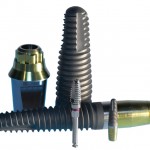
Dental implants are being increasingly used to replace missing teeth. Maintaining healthy supporting tissues is key to their long-term success. Plaque accumulation around implants can lead to peri-implant mucositis, which if left untreated can lead to peri-implantitis. The aim of this review was to compare the clinical effectiveness of different non- surgical treatments for peri-implantitis using a network meta-analytic approach.
Methods
Searches were conducted in the PubMed, SCOPUS, CINAHL, DARE and Web of Knowledge databases. These were supplemented by handsearching on relevant dental journals. Randomised controlled trials (RCTs) using non-surgical approaches to peri-implantitis were considered. Study selection, and data abstraction was conducted independently by two reviewers. Risk of bias assessment of the individual studies was undertaken. Clinical attachment loss (CAL) and pocket probing depth (PPD) measures were used to assess effectiveness. Bayesian network meta-analysis was conducted using the Bayesian random-effects hierarchical models.
Results
- 11 RCTs involving 329 patients were included (10 used parallel design, 1 a split mouth approach).
- 7 of the trials were industry supported.
- Debridement in conjunction with antibiotics achieved the greatest additional PPD reduction in comparison to debridement only (0.490 mm; 95% credible interval: -0.647; 1.252).
- The highest probabilities of being the most effective interventions were achieved by Vector system (p = 20.60%), debridement plus periochip (p = 20.00%) and photodynamic therapy (p = 18.90%).
- GRADE assessment of the overall evidence quality was very low.
Conclusions
The authors concluded
The present systematic review and network meta-analysis on non-surgical approaches for treating peri-implantitis showed that various single and combined non-surgical therapies yielded greater PPD reduction than debridement only. However, these results should be interpreted with caution due to the large credible intervals. Current evidence does not conclusively show that any particular non-surgical treatment for peri-implantitis performs better than debridement alone.
Commentary
The author’s conclusion is similar to the 2012 Cochrane review by Espositio et al which noted:-
There is no reliable evidence suggesting which could be the most effective interventions for treating peri-implantitis. This is not to say that currently used interventions are not effective.
The Cochrane review was slightly broader in that it was considering all treatments, including surgical approaches for the management of peri-implantitis. They only included 9 trials 5 of which were non-surgical. While this review does include more studies they are generally small involving between 11- 60 patients. The studies have a relatively short follow-up period of 12 months. As the authors point out there were concerns regarding the risk of bias assessments of the studies and the overall quality of the evidence was assessed as low. The authors also note that the differences between the therapies are small with large credible intervals, which could be accounted for by the heterogeneity between the studies. This review along with the Cochrane review show that we have little good evidence of the best way of managing peri-implantitis and properly conducted appropriately powered high quality trials are needed.
Links
Faggion CM Jr, Listl S, Frühauf N, Chang HJ, Tu YK. A systematic review and Bayesian network meta-analysis of randomized clinical trials on non-surgical treatments for peri-implantitis. J Clin Periodontol. 2014 Oct; 41(10):1015-25. doi: 10.1111/jcpe.12292. Epub 2014 Aug 11. PubMed PMID: 25039292.
Esposito M, Grusovin MG, Worthington HV. Interventions for replacing missing teeth: treatment of peri-implantitis. Cochrane Database Syst Rev. 2012 Jan 18;1:CD004970. doi: 10.1002/14651858.CD004970.pub5. Review. PubMed PMID: 22258958.

Don’t miss – Peri-implantitis: little evidence for particular non-surgical treatments http://t.co/rEDSSF9vEx
@TheDentalElf indeed, and not to many studies about this subject
[…] Dental Elf -20th Oct 2014 – Peri-implantitis:little evidence that particular non-surgical treatments are better than debridement… […]
[…] Dental Elf – 20th Oct 2014 – Peri-implantitis: little evidence that particular non-surgical … […]
[…] Dental Elf – 20th Oct 2014 – Peri-implantitis: little evidence that particular non-surgi… […]